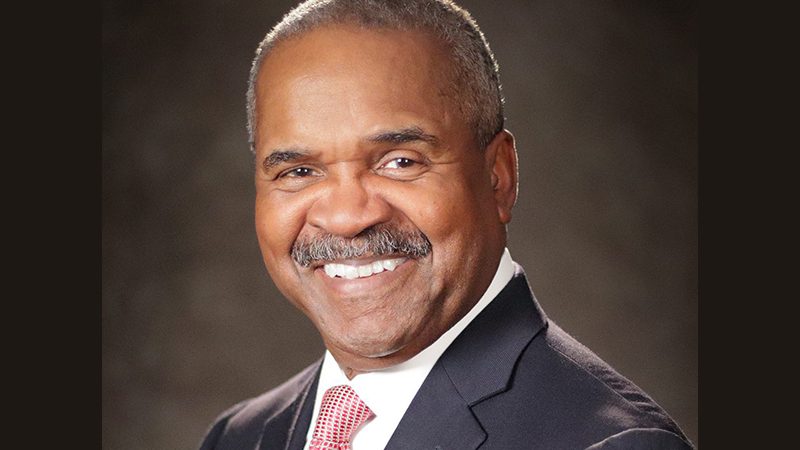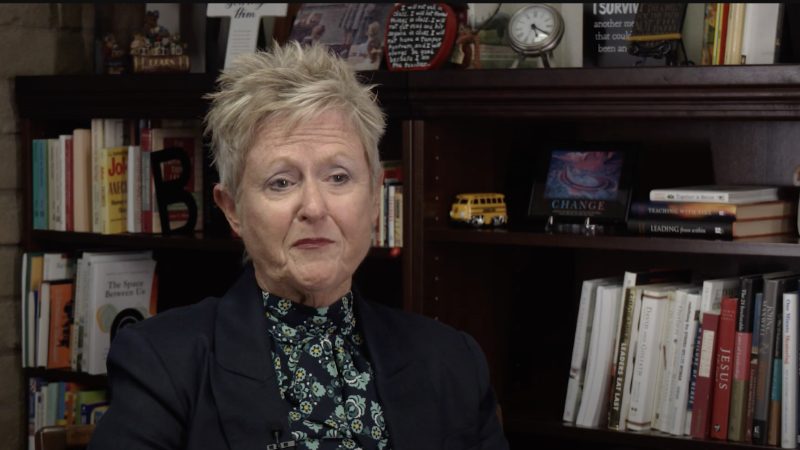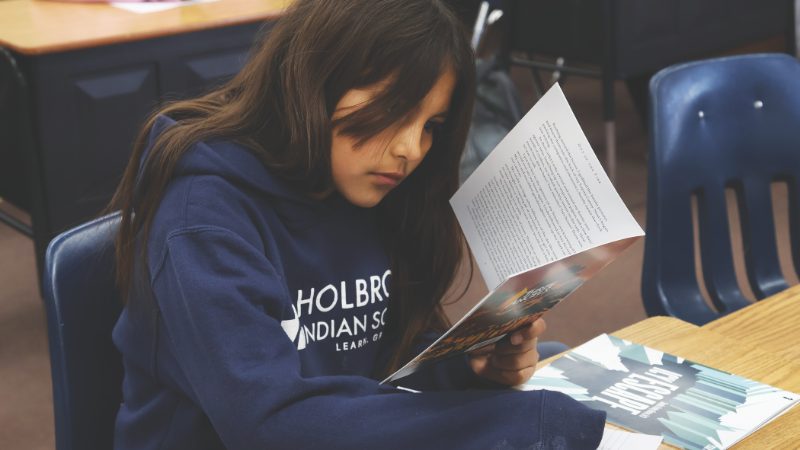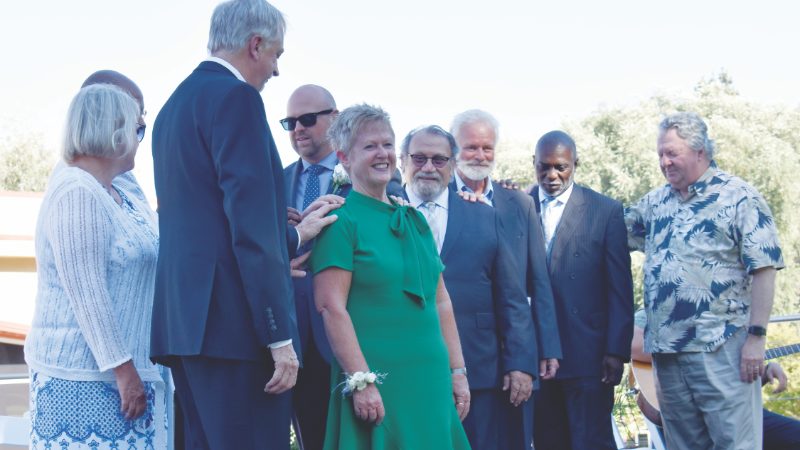
There is no line of distinction between faith and work. As assistant vice president for community partnerships and director of the Institute for Community Partnerships at Loma Linda University Health, I live out my faith in the work of enriching people’s lives through outreach, education, and mentorship. The nice thing about my job is that it is also my ministry.
I had a great example of what a service- and ministry-focused life looked like from my mother, Norma Alban, who to this day remains active in educational ministry at the Southeastern California Conference. Growing up in church also taught me the value of service through Pathfinders, Dorcas, and other ministries.
My parents separated when I was a baby due to my mother’s decision to be baptized into the Adventist church. She was baptized at the Spanish American church next to White Memorial Hospital in East Los Angeles, the hospital where she worked as a housekeeper at the time. My father was against her getting baptized, but she chose to follow her conscience despite the consequences.
My mother, now on her own, got a call to work at the Colegio Adventista del Ecuador (CADE) teaching English, and she accepted by faith. We went to live in Ecuador for a few years, and the vision for service started to ignite in my heart during those early years of my life.
When we came back to the U.S., my mother was a graduate student at Walla Walla College. During our time in Walla Walla, I observed my mother serving local migrant workers and their families, both as a Head Start preschool teacher and through personal ministry giving Bible studies in their homes. The interaction with the migrant families during that time nurtured in me a heart for service.
Earlier in my life I had considered becoming a veterinarian, but my time in Walla Walla, surrounded by the migrant community, and a transformative student mission year abroad in Korea planted seeds in my heart for working with communities of people.
I went on to complete my undergraduate studies at Southern Adventist University, and after a year of mission I went to Andrews University, where my future wife Anastasia had transferred from Southern. While at Andrews, I also interacted with migrant workers in Michigan, and it was there that I decided to pursue public health as a career.
Once at Loma Linda University Health, my passion for minority health, education, and health equity was instrumental in the creation of Promotores Academy at San Manuel Gateway College on LLU’s San Bernardino campus. This academy is a certificate program for community health workers (promotores de salud) who are trained to bridge the gap between health systems and the community.
In essence, the program trains lay people to be liaisons between the community and the healthcare systems. Students in the program receive training in individual and community capacity building, health promotion and disease prevention, cultural mediation, advocacy, home visitation skills, and more. Upon completion of the program, students go on to work at fostering and sustaining health in their communities, while earning a livable wage and benefits.
The tattoo removal program, founded by Sigrid Burruss, MD, FACS, and supported by the Institute for Community Partnerships, is another program that helps provide people with opportunities for a fresh start by removing tattoos that could otherwise hinder their future success. Burruss would repeatedly see young men coming in with stab and gunshot wounds, and she started thinking about violence prevention and how to address the root cause of this problem.
Removing tattoos is a means of violence prevention when tattoos are gang affiliated. Even if a person is no longer in a gang, a visible gang tattoo could potentially be problematic even years down the road. The tattoos may no longer reflect who they are as a person, and they want a fresh start in life.
It is exactly this type of hands-on practical service and relationship building that most meaningfully impacts people’s lives, especially given the social, health, and educational needs in the communities surrounding Loma Linda. When He chose this place through Ellen White, God knew that there is a real need and opportunity for service here. This is a way to continue the healing and teaching ministry of Jesus Christ.
And as someone who had positive role models and a strong support system for getting an education, I also wish to do the same for other young people.

According to the Institute for Community Partnerships website, African Americans, Latinos, and American Indians are about one quarter of the population of the U.S. but represent less than 10% of the workforce in the health professions of medicine, nursing, dentistry, and pharmacy. The Institute for Community Partnerships offers underrepresented minority high school students a pipeline program for those interested in a health professions career by preparing them to graduate high school and attend college.
I love nothing more than interacting with students and community members to better serve them and encourage them in their professional and educational journeys. As a fully bilingual professional, I also welcome the opportunity to speak with Spanish-speaking parents to encourage and support them as they support their children’s education.
For this reason, I make my office phone number available to anyone seeking guidance and encouragement in pursuing their education. If you are a young person considering a career in the health sciences or curious about health careers, or if you are a parent who would like to better support your student or even explore your own career opportunities, you may reach me at 909-558-7754.
There is nothing better than connecting with community. It becomes an opportunity for kinship.
_____________________________
Juan Carlos Belliard holds a Ph.D. from Claremont Graduate University and a Master’s in Public Health from Loma Linda University, where he now teaches Global Health at the School of Public Health. He and his wife, Anastasia, have two children, Victoria and Nicolás. The Belliards all share a love for music, reading, traveling, camping, running, and fútbol.
Cuando la fe y el trabajo son una misma cosa
Por Juan Carlos Belliard

No hay una línea de distinción entre la fe y el trabajo. Como vicepresidente asistente de asociaciones comunitarias y director del Institute for Community Partnerships de Loma Linda University Health, vivo mi fe en el trabajo al enriquecer la vida de las personas a través de la divulgación, la educación y la tutoría. Lo bueno de mi trabajo es que también es mi ministerio.
Tuve un gran ejemplo de cómo era una vida centrada en el servicio y el ministerio de mi madre, Norma Alban, quien hasta el día de hoy permanece activa en el ministerio educativo en la Southeastern California Conference. Crecer en la iglesia también me enseñó el valor del servicio a través de los Conquistadores, Dorcas y otros ministerios.
Mis padres se separaron cuando yo era un bebé debido a la decisión de mi madre de ser bautizada en la iglesia adventista. Fue bautizada en la iglesia Hispanoamericana junto al White Memorial Hospital en el este de Los Angeles, el hospital donde trabajaba como afanadora en ese momento. Mi padre estaba en contra de que se bautizase, pero ella eligió seguir su conciencia a pesar de las consecuencias.
Mi madre, ahora sola, recibió un llamado para trabajar en el Colegio Adventista del Ecuador (CADE) enseñando inglés y ella aceptó por fe. Nos fuimos a vivir a Ecuador por unos años y la visión del servicio comenzó a arder en mi corazón durante esos primeros años de mi vida.
Cuando regresamos a los Estados Unidos, mi madre era una estudiante de posgrado en Walla Walla College. Durante nuestro tiempo en Walla Walla, observé a mi madre sirviendo a los trabajadores migrantes locales y sus familias, tanto como maestra preescolar de Head Start como a través del ministerio personal dando estudios bíblicos en sus hogares. La interacción con las familias migrantes durante ese tiempo alimentó en mí un corazón para el servicio.
Al principio de mi vida había considerado convertirme en veterinario, pero mi tiempo en Walla Walla, rodeado de la comunidad migrante, y un año como estudiante misionero en Corea plantaron semillas en mi corazón para trabajar con comunidades de personas.
Continué mis estudios universitarios en la Southern Adventist University y, después de un año de misión, fui a Andrews University, donde mi futura esposa Anastasia se había transferido desde Southern Adventist University. Mientras estaba en Andrews, también interactué con trabajadores migrantes en Michigan, y fue allí donde decidí seguir la salud pública como una carrera.
Una vez en Loma Linda University Health, mi pasión por la salud de las minorías, la educación y la equidad en la salud fue fundamental en la creación de Promotores Academy en San Manuel Gateway College en el campus de LLU en San Bernardino. Esa academia es un programa de certificación para promotores comunitarios de salud capacitados para cerrar la brecha entre los sistemas de salud y la comunidad.
En esencia, el programa capacita a laicos para que sean enlaces entre la comunidad y los sistemas de salud. Los estudiantes en el programa reciben capacitación en desarrollo de capacidades individuales y comunitarias, promoción de la salud y prevención de enfermedades, mediación cultural, defensa, habilidades de visitas domiciliarias y más. Al finalizar el programa, los estudiantes pasan a trabajar para fomentar y mantener la salud en sus comunidades, mientras ganan un salario digno y beneficios.
El programa de eliminación de tatuajes, fundado por Sigrid Burruss, MD, FACS, y apoyado por el Institute for Community Partnerships, es otro programa que ayuda a proporcionar a las personas oportunidades para un nuevo comienzo al eliminar los tatuajes que de otro modo podrían obstaculizar su futuro éxito. Burruss veía repetidamente a jóvenes que entraban con heridas de arma blanca y de bala, y comenzó a pensar en la prevención de la violencia y en cómo abordar la causa raíz de ese problema.
La eliminación de tatuajes es un medio para la prevención de la violencia cuando los tatuajes están afiliados a las pandillas. Incluso si una persona ya no está en una pandilla, un tatuaje visible de una pandilla podría ser potencialmente problemático incluso años después. Es posible que los tatuajes ya no reflejen quiénes son como personas y quieran una nueva vida.
Es exactamente ese tipo de servicio práctico y la construcción de relaciones lo que impacta más significativamente la vida de las personas, especialmente dadas las necesidades sociales, de salud y educativas en las comunidades que rodean Loma Linda. Cuando escogió este lugar, a través de Ellen White, Dios sabía que había una verdadera necesidad y oportunidad de servicio aquí. Esa es una manera de continuar el ministerio de sanidad y enseñanza de Jesucristo.
Como alguien que tuvo modelos positivos y un firme sistema de apoyo para obtener una educación, también deseo hacer lo mismo para otros jóvenes.

Según el sitio web del Institute for Community Partnerships, los afroamericanos, los latinos y los indios americanos son aproximadamente una cuarta parte de los EE. UU., pero representan menos del 10% de la fuerza laboral en las profesiones de medicina, enfermería, odontología y farmacología. El Institute for Community Partnerships ofrece a los estudiantes de high school de minorías subrepresentadas un programa de canalización para aquellos interesados en una carrera en las profesiones de la salud preparándolos para graduarse de high school y asistir a un college.
Nada me gusta más que interactuar con los estudiantes y miembros de la comunidad para servirles mejor y alentarlos en su recorrido profesional y educativo. Como profesional totalmente bilingüe, también agradezco la oportunidad de poder hablar con padres de habla hispana para alentarlos y apoyarlos mientras apoyan la educación de sus hijos.
Por esa razón, pongo el número de teléfono de mi oficina a disposición de cualquier persona que busque orientación y aliento para continuar su educación. Si usted es una persona joven que está considerando una carrera en las ciencias de la salud o tiene curiosidad por las carreras de la salud, o si es un padre que desea apoyar mejor a su estudiante o incluso explorar sus propias oportunidades profesionales, puede comunicarse conmigo al 909-558-7754.
No hay nada mejor que estar en conecto con la comunidad. Es una oportunidad para establecer una relación personal.
_____________________________
Juan Carlos Belliard tiene un Ph.D. de Claremont Graduate University y una Maestría en Salud Pública de Loma Linda University, donde ahora enseña Salud Global en la Escuela de Salud Pública. Él y su esposa, Anastasia, tienen dos hijos, Victoria y Nicolás. Todos los Belliards comparten el amor por la música, la lectura, viajar, acampar, correr y el fútbol.





